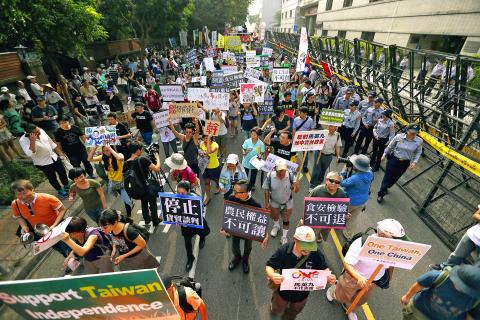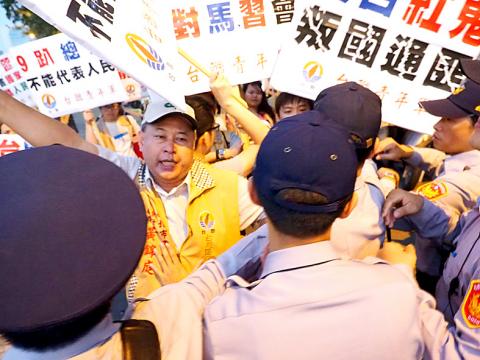A series of protests at several locations in Taipei against the meeting between President Ma Ying-jeou (馬英九) and Chinese President Xi Jinping (習近平) began on Friday night and continued yesterday morning until Ma departed for Singapore at 5:30am.
At about 11pm on Friday night, dozens of people holding up banners advocating Taiwanese independence arrived in front of the Presidential Office Building, accusing Ma of being a “9 percent president” trying to “sell off Taiwan.”
“No to the opaque Ma-Xi meeting, no to concessions on Taiwan’s sovereignty,” the protesters chanted until police officers moved in to remove them, at which the chanting turned into angry yelling and shouting.

Photo: EPA
Both protesters and police officers were injured in a clash between the two sides.
After several waves of clashes, the police lined up behind shields and pushed the protesters away, forcing them to leave Ketagalan Boulevard in front of the Presidential Office Building.
The protesters then headed to the nearby Legislative Yuan, where clashes also broke out and some scaled the front gate of the legislature’s compound.

Photo: EPA
“We are here to voice our opposition to Ma’s meeting with Xi, because his low approval rating shows that Ma has no right to speak for the Taiwanese public,” National Taiwan University student Tien Cheng-hung (田政弘) said. “After the 1992 cross-strait meeting [in Hong Kong], the so-called ‘1992 consensus’ suddenly came into existence. Who knows what will result of the Ma-Xi meeting?”
Following the arrival of reinforcements shortly after 12:30am, an overwhelming number of police began to push demonstrators out of the Legislative Yuan compound, triggering yet another wave of clashes.
Although the compound was cleared out not long after 1am, nearly 200 more people arrived to participate as news of the protest began to spread.
The protesters remained outside the legislature, occupying the right-most lane on Zhongshan N Road and refusing to leave, despite repeated calls by police.
At about 3am, another group of protesters led by Sunflower movement student leader Chen Wei-ting (陳為廷) gathered outside Taipei International Airport (Songshan airport) — where Ma’s flight was scheduled to depart at 5:30am — and tried to force their way into the air force’s Songshan Air Base command building.
Chen and 26 other protesters were quickly arrested by police, and yesterday afternoon were sent to the Taipei District Prosecutors’ Office for questioning.
Citing concern over the possibility of more protests, police later closed off the portion of Minquan E Road in front of the airport.
A third group of protesters mobilized by the Taiwan Solidarity Union (TSU) arrived outside the airport at 5am, planning to hurl shoes and other items at the president’s convoy, but were thwarted after the convoy took a detour.
The protesters then burned a funeral-style portrait of Ma, resulting in the arrest of TSU Department of Youth Affairs director Chang Chao-lin (張兆林).

The CIA has a message for Chinese government officials worried about their place in Chinese President Xi Jinping’s (習近平) government: Come work with us. The agency released two Mandarin-language videos on social media on Thursday inviting disgruntled officials to contact the CIA. The recruitment videos posted on YouTube and X racked up more than 5 million views combined in their first day. The outreach comes as CIA Director John Ratcliffe has vowed to boost the agency’s use of intelligence from human sources and its focus on China, which has recently targeted US officials with its own espionage operations. The videos are “aimed at

STEADFAST FRIEND: The bills encourage increased Taiwan-US engagement and address China’s distortion of UN Resolution 2758 to isolate Taiwan internationally The Presidential Office yesterday thanked the US House of Representatives for unanimously passing two Taiwan-related bills highlighting its solid support for Taiwan’s democracy and global participation, and for deepening bilateral relations. One of the bills, the Taiwan Assurance Implementation Act, requires the US Department of State to periodically review its guidelines for engagement with Taiwan, and report to the US Congress on the guidelines and plans to lift self-imposed limitations on US-Taiwan engagement. The other bill is the Taiwan International Solidarity Act, which clarifies that UN Resolution 2758 does not address the issue of the representation of Taiwan or its people in

US Indo-Pacific Commander Admiral Samuel Paparo on Friday expressed concern over the rate at which China is diversifying its military exercises, the Financial Times (FT) reported on Saturday. “The rates of change on the depth and breadth of their exercises is the one non-linear effect that I’ve seen in the last year that wakes me up at night or keeps me up at night,” Paparo was quoted by FT as saying while attending the annual Sedona Forum at the McCain Institute in Arizona. Paparo also expressed concern over the speed with which China was expanding its military. While the US

SHIFT: Taiwan’s better-than-expected first-quarter GDP and signs of weakness in the US have driven global capital back to emerging markets, the central bank head said The central bank yesterday blamed market speculation for the steep rise in the local currency, and urged exporters and financial institutions to stay calm and stop panic sell-offs to avoid hurting their own profitability. The nation’s top monetary policymaker said that it would step in, if necessary, to maintain order and stability in the foreign exchange market. The remarks came as the NT dollar yesterday closed up NT$0.919 to NT$30.145 against the US dollar in Taipei trading, after rising as high as NT$29.59 in intraday trading. The local currency has surged 5.85 percent against the greenback over the past two sessions, central